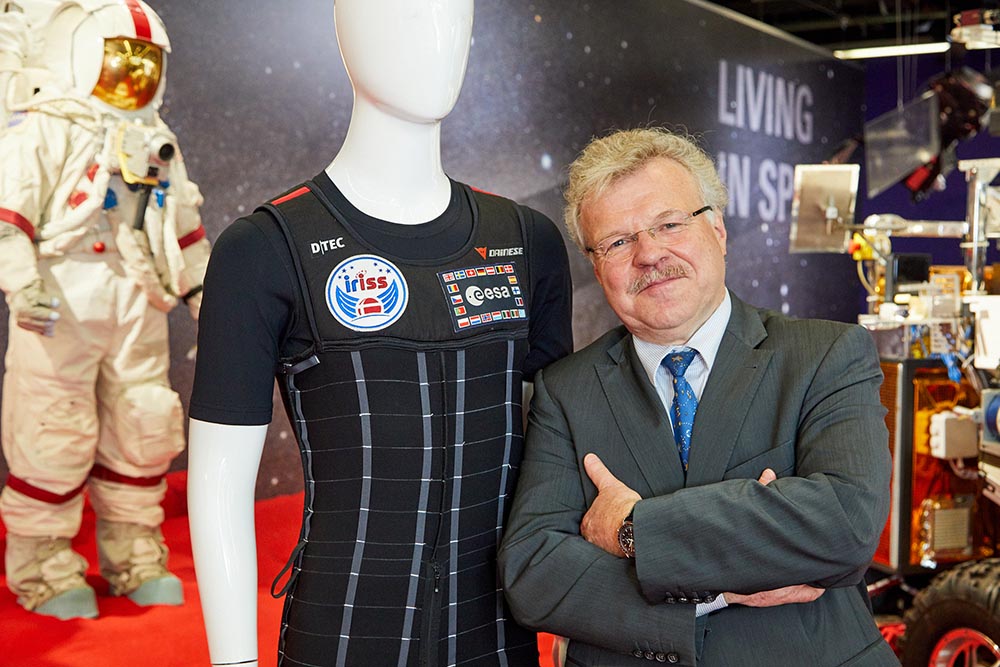Visitors attending Techtextil 2017. Photo: Messe Frankfurt Exhibition GmbH/Jean-Luc Valentin
Under a generally positive global economic climate, the latest Techtextil held in May in Frankfurt am Main, Germany, was another hugely successful event with record numbers of visitors and exhibitors.
The international trade fair for technical textiles and nonwoven, which is held every two years in conjunction with Texprocess, the trade fair for the processing of textile and flexible materials, together attracted more than 47,500 visitors – an increase of 14% over the previous events in 2015 – from 114 countries.
Behind Germany, the three main visitor nations at Techtextil were Italy, France and Turkey; at Texprocess, they were Italy, Romania and Portugal. Particularly striking this year was the many young textile professionals attending both fairs.
Together the two events recorded 1,789 exhibitors from 66 countries: Techtextil had 1,477 (+6% on 2015) from 55 countries (71% from outside Germany), while Texprocess had 312 (+14%) from 36 countries.
There were 14 national pavilions, including new exhibitor participation from Lebanon, Mexico and Vietnam. Best represented were suppliers of smart and high-tech materials and services for industry, mobility, architecture and building.
Exhibitors reported that they sometimes had trouble in answering all enquiries on their booths, with visitors having to queue on occasions; the recent move from a three- to a four-day event appears justified.
“The high number of exhibitors reflects the outstanding dynamism amongst producers of technical textiles, who are enjoying continuing growth,” explained Detlef Braun, member of the executive board of Messe Frankfurt.
Mission to Mars
Billed as a highlight of the show, the Living in Space event, organized in cooperation with the European Space Agency (ESA) and the German Aerospace Centre (DLR), illustrated the range of applications of textiles in the aerospace industry.
Opened by ESA astronaut Dr. Reinhold Ewald, the space-travel oriented exhibition featured a virtual-reality journey to Mars, a gallery of exhibitor’s materials for use in space and a “Space Habitat” designed by architect Ben van Berkel.
Meanwhile, with designs from France, Portugal, Italy and Germany, the Innovative Apparel Show drew packed crowds with a display of high-tech textiles on the catwalk several times throughout the fair, while the Digital Textile Micro Factory showed a complete textile production line for apparel in operation, including CAD/design, printing, cutting, assembling and labeling.
And for the first time the Dornbirn Man-Made Fibers Congress organized a block of lectures at the 19th Techtextil Symposium.

Innovation awards
Eight smart products were chosen for the Techtextil Innovation Award 2017. In the “new application” category, the winners were Centexbel of Belgium for an intelligent knee brace that supports patients during rehabilitation after knee surgery, and Peterseim Strickwaren of Germany, which developed a basalt knitted fabric that protects maritime systems, such as buoys, from environmental influences and reduces maintenance costs.
In the “new technology” category, awards went to German company V. Fraas Solutions in Textile for SITnet, a load-securing net distinguished by joining points for the belts, which are warp-knitted instead of sewn, and Vetex of Belgium for its OC2PUS technology, which permits a polyurethane coating to be applied to flexible substrates without the use of solvents, such as the controversial dimethylformamide.
In the “new product” category, the Germany-based start-up Texlock was chosen for its lightweight and flexible textile-based bicycle lock, while Penn Textile Solutions was selected for Ombra-DLS, a shading net for use in facade construction and window installation.
Two products were singled out in the “new material” category: the Institute of Textile Chemistry and Chemical Fibres (ITCF) Denkendorf received the award for Purcell, a sustainable composite made of pure cellulose, which is used not only as a high-strength reinforcement fiber, but also as a matrix component, while Durafiber Technologies of France was chosen for an alkaline-resistant polyester high-tenacity yarn.

Trevira ownership
Ahead of the Frankfurt show, Indorama Ventures (IVL) announced it had become the sole owner of Germany-based specialty polyester fibers producer Trevira through the acquisition of the remaining 25% shareholding from its earlier joint venture partner Sinterama of Italy.
“We see further growth potential, especially in the hygiene and automotive segments, as well as in the high-end home textiles business,” said Uday Gill, chief executive officer of IVL’s Fibres Business.
Amongst the latest developments from Trevira are yarns made from biopolymers, such as polylactic acid (PLA), while a novelty presented at Techtextil was a phosphorescent yarn that continues to glow in the dark for up to seven hours after brief exposure to light, which could be of interest for vehicle interiors.
A further new development is a high-tenacity permanently flame-retardant textured yarn produced in collaboration with sister company PHP. This is particularly suitable for furnishing textiles, such as wallcoverings, where it combines higher tenacity with less elongation.
Renewable resources
Germany-based high-tenacity filament yarn producer PHP Fibers (another IVL subsidiary) focused on its Enka TecTape Hybrid Roving and technical filament yarns based on biopolymers.
Used for the automated manufacture of continuous fiber-reinforced composites Enka TecTape Hybrid Roving combines continuous reinforcing fibers with thermoplastic matrix fibers.
To reduce carbon dioxide emissions, PHP Fibers offers two technical yarn types based on renewable resources.
Diolen 150BT is based on PLA polymers that are biodegradable in composting facilities. Owing to its strength, it is particularly suitable for use in agricultural textiles requiring limited durability.
Enka Nylon BIO is a bio-based polyamide yarn that is said to have good yarn and polymer properties, and also features lower moisture absorption and polymer density than synthetic technical yarns, such as polyamide 6 or 6,6.
All change at Sinterama
On the eve of Techtextil, colored polyester filament yarn producer Sinterama announced that a corporate credit recovery fund managed by IDeA Capital Funds SGR had acquired 51% of the company.
Sinterama chief executive officer Guglielmo Fiocchi continues in his role, while president and former CEO Paolo Piana joins the new board of directors as non-executive chairman.
Roberto Saviane, IDeA Capital Funds SGR chairman, said the investment will improve Sinterama’s growth and development plan, “leveraging the strong technological and production know-how and core assets of the company”.
Piana added: “We recently sold [the remaining] Trevira shares, a non-core asset, in order to focus on our investments. Both Brazil and Asia are performing extremely well, and European business is recovering.”
Meanwhile, odor-control technology provider Polygiene has been working with Sinterama to make a new version of its Newlife recycled fiber.
Newlife is a certified system of recycled polyester filament yarns from 100% post-consumer polyethylene terephthalate (PET) bottles sourced and processed into a polymer through a mechanical process and spun in Italy that is also 100% recyclable at the garment level.
The new antibacterial yarn is treated at fiber level and is designed to bring customer benefits in terms of odor control, easy care and longer lasting garments, particularly in the corporate/workwear and the care sectors.
Sustainability in agriculture
Cellulosic fiber producer Lenzing emphasized the potential of lyocell fiber in agriculture, such as support strings used in growing crops like tomatoes or hops.
Marina Crnoja-Cosic, head of technical textiles, explained that Tencel fibers are biodegradable and compostable; when made into support strings, they are stronger and thinner than cotton strings and less polluting than steel, which is generally not recycled in horticultural end-uses.
Further, Tencel fibers have been tested according to EU criteria for food contact use and can therefore be used in agriculture for food products.
“Any reduction in the use of plastics helps to protect our environment,” said Crnoja-Cosic. “In agriculture in particular, sustainable materials should be used, and we are continuing to work to establish Tencel fibers in this field. For example, mussel nets have already been tested and are in use in the northern Adriatic Sea.”
Wider portfolio
RadiciGroup’s synthetic fibers and nonwovens business announced a wider polyamide and polyester product portfolio as a result of recent investments in production lines.
At its Selbitz site in Germany, the company has invested €3 million to develop and produce household and industrial products for the abrasive sector, as well as felts for the industrial sector.
In Italy, a bicomponent production line for the manufacture of spunbond nonwovens is due to become operational by the end of 2017 and will increase total production capacity by 50%.
Meanwhile, TWD Fibres of Germany showed its new, solution-dyed Diolen polyester yarns for use in workwear and protective equipment, while the company’s new Diolen Industrial Blend bicomponent fiber with a low melting component received the most visitor interest at Techtextil, revealed CEO Dr. Oliver Bensch.
BFI investments
Polyolefin fiber supplier Beaulieu Fibres International announced new investments at its plants in Belgium and Italy amounting to more than €80 million up to 2018.
The €15 million investment in Belgium will be commissioned in November 2017, confirmed Donald De Deygere, sales and marketing manager, industrial fibers.
The company’s portfolio of mono, round and trilobal fibers, as well as bicomponent fibers, was promoted at Techtextil for such sectors as automotive, flooring and geotextiles.
Meanwhile, Beaulieu Technical Textiles featured its extrusion coating and extrusion laminating capabilities for polypropylene, polyethylene and polyester woven fabrics and nonwovens.
Invista PA 6,6 expansion
Invista announced that it is investing more than $65 million in fiber production equipment at its Camden, South Carolina, USA, facility. This investment will expand capacity of polyamide 6,6 fiber used in a wide range of applications.
According to the company, the investment will significantly increase domestic US capacity of high-tenacity specialty fibers used in durable Cordura fabrics.
The new assets will also be capable of manufacturing bulked continuous filament and fibers for airbags and industrial sewing threads.
Biodegradable polymer
Kaneka of Japan showed samples of fibers using the biodegradable polyester-type polymer Kaneka Biopolymer PHBH, in which oils and fats are the main raw materials; a 1,000-tons/year plant commenced operation in 2011.
As well as being biodegradable, PHBH features heat resistance, hydrolysis resistance, vapor barrier and softness, while its physical properties are similar to those of polyethylene and polypropylene.
Transport security fabric
Germany’s Kufner launched several smart textile-based products, including an innovative transport security system, which features a cut-resistant fabric fitted with sensors and a GPS/GSM tracking function to protect valuable freight against theft and unauthorized access.
In the case of damage owing to mechanical or chemical impact, an alert is triggered that can be forwarded upon request to the nearest police station, including a positioning indication via an app.
Besides apparel applications, such as workwear, active sportswear and health care garments, Kufner is also now looking at other applications for its THS (textile heating systems) technology, such as heated church pews, heated artificial turf in sports stadiums and greenhouse fabrics.
The technology’s use in automotive seating is still in the development stage, and the company presented prototypes in this area in Frankfurt together with partners in the automotive industry, including Audi.
Another Kufner highlight at Techtextil was XShield, which provides protection from electromagnetic radiation and unauthorized access to RFID data.
Protective wear
Klopman International displayed the new K-Flame Xtra 245 softshell/laminate, an inherently flame-retardant fabric that features a windproof and rainproof breathable membrane for a range of personal protective wear end-use applications in hazardous and environmentally challenging industries.
The company also exhibited its new Stretch fabric range, created with polyester/cotton, which is said to offer greater freedom of movement and total ease of wear.
Johns Manville, which produces a wide range of technical nonwovens for building and construction, filtration, energy storage and composites at 11 sites in Germany, the USA and China, highlighted tailor-made glass fiber nonwovens for luxury vinyl tiles used as a modern flooring material.
Barcelona, Spain-based StingBye presented new developments of its woven anti-mosquito fabrics, which have been commercialized for the past two years. The 50% cotton/50% polyester fabrics are dipped in permethrin to prevent insect bites.
A recent innovation is a children’s hair tie that protects against head lice, and the company is also introducing clothing for pets to protect against a range of pests.
The next Techtextil and Texprocess will be held in Frankfurt am Main, Germany, from 14 to 17 May 2019.


